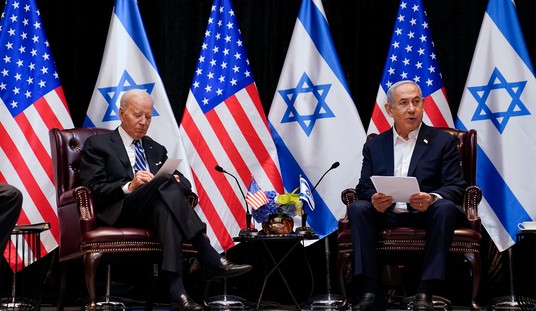Montana Senator John Walsh’s campaign was already in trouble when the New York Times broke the story of his massive plagiarizing for his master’s thesis at the Army War College.
His disingenuous “explanation” should seal his doom.
Walsh, appointed to fill the remaining term of Max Baucus and now running for a full term, is a former adjutant general of the Montana National Guard. He was a battalion commander in the Iraq War — the only senator who served in that conflict.
But the plagiarism charge — and Walsh’s effort to minimize it — reveals a soldier who lacks the integrity to admit his mistakes honestly and forthrightly.
Walsh dismissed the notion that the plagiarism allegations will affect his candidacy.
“I don’t really see it as having a negative impact on the campaign,” he told The Associated Press in a telephone interview Wednesday. “Montanans are really pleased with what I am accomplishing back here (in Washington).”
Walsh has a short window in which to figure out whether the allegations could be too toxic for him to win the Nov. 4 election. A candidate has until Aug. 11 to withdraw from this year’s contest, and the state party has until Aug. 20 to name a replacement candidate, Montana Secretary of State Linda McCulloch said Thursday.
If Walsh decides to drop out after the ballots are certified on Aug. 21, a new candidate can’t be appointed, and Walsh’s name will stay on the ballot, she said.
Walsh said that when he wrote the thesis, he had post-traumatic stress disorder from his service in Iraq, was on medication and was dealing with the stress of a fellow veteran’s recent suicide.
“I don’t want to blame my mistake on PTSD, but I do want to say it may have been a factor,” the senator said. “My head was not in a place very conducive to a classroom and an academic environment.”
He said he didn’t plagiarize but that his thesis contained “a few citations that were unintentionally left out.”
A “few citations”? AP supplies details of Walsh’s dishonesty:
Walsh submitted his thesis, titled “The Case for Democracy as a Long Term National Strategy,” nearly two years after he returned from Iraq and about a year before he became Montana’s adjutant general overseeing the state’s National Guard and Department of Military Affairs.
The first page borrows heavily from a 2003 Foreign Affairs piece written by Thomas Carothers, vice president for studies at the Carnegie Endowment for International Peace, and a 2009 book by Natan Sharansky with Ron Dermer, “The Case for Democracy: The Power of Freedom to Overcome Tyranny and Terror.”
Sharansky is a former Soviet dissident and chairman of the Jewish Agency for Israel. Dermer is the Israeli ambassador to the United States.
All six of the recommendations that Walsh listed at the end of his paper are taken nearly word-for-word without attribution from a Carnegie paper written by Carothers and three other scholars at the institute.
One section is nearly identical to about 600 words from a 1998 paper by Sean Lynn-Jones, a scholar at the Belfer Center for Science and International Affairs, a research institute at Harvard.
We should sympathize and support Senator Walsh in his battle against PTSD, but how is it remotely connected to deliberately using the work from others and claiming it as your own? It is certainly far more than leaving out a few “citations.”
Previously, his military record was questioned when it was revealed that he received a letter of reprimand from the Army as the result of an inspector general’s report that accused him of improper conduct. The AP reports:
Walsh’s military record was first questioned in January when records revealed the Army reprimanded him in 2010 for pressuring Guardsmen to join a private association for which he was seeking a leadership role.
Walsh was adjutant general at the time and wanted to become vice chairman of the National Guard Association of the United States. In the reprimand, Army Vice Chief of Staff Peter Chiarelli said he questioned Walsh’s ability to lead.
Most analysts had already place Montana in the GOP column. But a recent poll suggests the race is tightening:
Human Events and Gravis Marketing polled the US Senate race in Montana first. Gravis found a tightening race between Senator John Walsh and Representative Steve Daines. Representative Daines lead Senator Walsh 45%-41% with the Libertarian candidate Roger Roots taking 6% of the vote. Daines’ lead might increase as time goes on because third-party candidates have been known to have their percentages fizzle closer to Election Day. “An incumbent such as Senator Walsh might be getting worried,” Gravis Marketing head Doug Kaplan said, “An incumbent that has percentages in the low 40’s at this time of the year might have a hard time getting re-elected.”
The Daines campaign had no comment on the charges. No doubt they are allowing their opponent to destroy himself without any help from them. For, indeed, if the Army War College finds substance in these charges, it will destroy a major selling point for Walsh’s campaign: his honorable service as National Guard commander.
Politicians like Joe Biden have survived plagiarism charges before. In and of itself, plagiarism is probably not a deal killer with the Montana electorate. But the dual blows to Walsh’s military record are probably enough to either cause him to withdraw from the race, or lose handily in November.









Join the conversation as a VIP Member